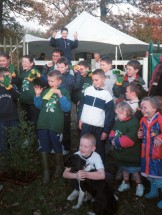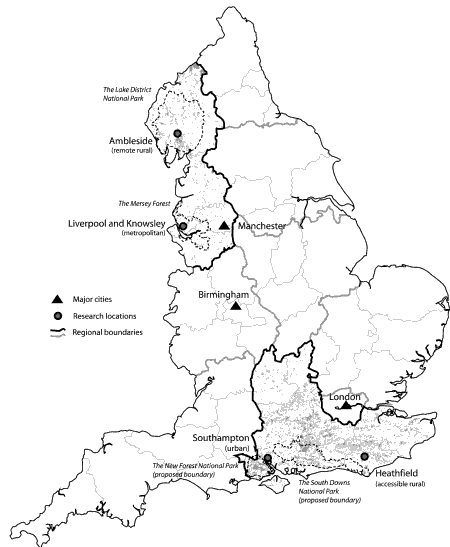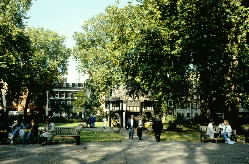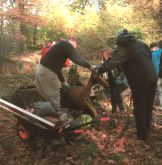Summary
How and why do people in northwest and southeast England value woodlands?
Summary

There is an important relationship between people’s views of trees and woodlands and their concerns about development, the loss of green space and access to woodlands. Forest Research evaluated the value that people place on woodlands. The team compared attitudes between groups from northwest and southeast England and between rural and urban populations.
Key findings and recommendations
Findings
- Escape: people appreciate forests and woods because they offer escape from everyday life and pressures
- Cheap: people on low incomes appreciated that it costs very little to visit woods
- Safety: women generally felt uncomfortable about visiting woods alone
- Loss of greenspace: all groups were worried about over development and loss of greenspace
- Education: all groups felt education about woods was important – rural citizens wanted to learn more about their environment while urban citizens stressed the importance of educating children to respect the natural environment
- Connections: people’s attitudes to woods related to their wider perspectives on environmental and social change
Recommendations
- Encourage public participation: good quality and fair public participation in woodland decision-making can engender public trust and confidence, and allow local people to express their views and contribute to woodland improvement
- Seek local knowledge: residents’ knowledge of their local area provides relevant information for organisations which may affect their management plans and operations
- Multi-layered meaning: forest managers need to respect that woods are associated with experiences and memories – they are not just physical spaces
- Security: woods that appear neglected or abused generate greater anxiety, so organising events, activities and clearing away rubbish all help to increase visits and regular use of a site
Publications
Report – A sort of magical place
Funders and partners
A partnership event between Forest Research, Lancashire Constabulary, CABE Space and English Nature.
Status
Completed 2004.
Contact
Social and cultural values of woods – Organisational perspectives
As part of the research interviews were also undertaken with professionals within the Forestry Commission, Forest Enterprise, The Mersey Forest, Knowsley Metropolitan Borough Council and a Community Development Organisation.
Key issues that arose from interviews with representatives from these organisations included:
- Providing public benefits, and understanding what they are, was seen to be a key focus across all organisations.
- Adequate resources to manage existing areas, create new woodlands and increase public benefits were thought to be more widely needed.
- Improving people’s quality of life and well-being was seen to be a significant concept in Sustainable Forest Management.
- Involving people and sustaining participation were acknowledged as important though difficult. It was seen as vital to engage with publics in both urban and rural areas.
- Partnerships between organisations and between organisations and communities were viewed as increasingly important and becoming more extensive.
- The development of markets for value-added products and the use of local timber were issues thought to need greater consideration.
Sustainable forest management
This is the central aim of the UK National Forest Programme. Included within this are ideas of community participation: environmental decision-making in this view includes stakeholders and ordinary citizens in a process of debate.
This debate is conditioned by the values, beliefs and attitudes that people bring to it. Therefore it makes sense to investigate these, to find out how they vary. For that reason participatory approaches in decision-making are advocated as the mix of values and benefits people gain will be different in different areas.
The areas where the research was undertaken were Liverpool, Knowsley and Ambleside in the northwest and Southampton and Heathfield in the southeast:

Woodland cover in northwest and southeast England and study locations
Social and cultural values of woods – Public perspectives
 Why are trees and woodlands important to people? This question has been addressed by research carried out in northwest and southeast England. Discussion groups were held with members of the public from a variety of different age groups and socio-economic background to allow them to discuss their use of woodlands and green space and why these places were important to them.
Why are trees and woodlands important to people? This question has been addressed by research carried out in northwest and southeast England. Discussion groups were held with members of the public from a variety of different age groups and socio-economic background to allow them to discuss their use of woodlands and green space and why these places were important to them.
In this piece of research woodlands were primarily valued for the escape they provided from the stress of everyday life and as somewhere to have contact with nature.
Why are woodlands and trees important to people?
From the discussion groups with members of the public the study found that trees and woodlands are important to people for a number of reasons:
- Woodlands were valued for the escape they provide from everyday life and pressures. Groups focused predominantly on the mental and emotional benefits they received in woodlands rather than the physical benefits.
- Cost is particularly significant especially for families, those on low incomes, the unemployed and non-car owners who felt that visiting green space or woodland was a relatively inexpensive day out.
- One of the key gender differences across all areas and ages was the suggestion by the majority of women in the groups that they would not feel comfortable visiting woodlands alone.
- All groups expressed concerns about increasing development. In the urban groups there was a desire not to lose any green space to further business development. In rural areas, the concern centred on housing and increasing numbers of people escaping from urban areas to live in the countryside.
- All groups saw education as important although urban and rural groups expressed this differently. Urban groups wanted children, specifically, to learn about and have contact with nature so that they would have respect for it. In rural areas, education was seen as an important element of learning and appreciating nature for all age groups.
- People’s views of trees and woodlands are related to wider issues over changes in society and concerns over environmental and cultural change.
How do woodlands and trees important make people feel?
It is important to understand not only what activities people are undertaking in woodlands such as walking or cycling but also how that makes them feel.
People often described the importance of having contact with nature to escape from the stress of their everyday lives. They described feelings of well-being and enjoyment in both using and viewing trees and woodlands.
People’s childhood memories of using trees and woods seemed to have an impact on how they used these areas as adults:
- They described going back to places they had enjoyed and valued as a child
- They talked about taking their own children or grandchildren to these places as well.
Opportunities to use woodlands
 Having the opportunity to use woodlands was not always easy.
Having the opportunity to use woodlands was not always easy.
Constraints to using these areas were identified as:
- Lack of transport to reach woodland
- Anti-social behaviour by others
- Concerns about personal safety
- Unmanaged woods with litter and evidence of vandalism
- Lack of easily accessible woodlands near to where people live
- Lack of time in busy modern lives.
